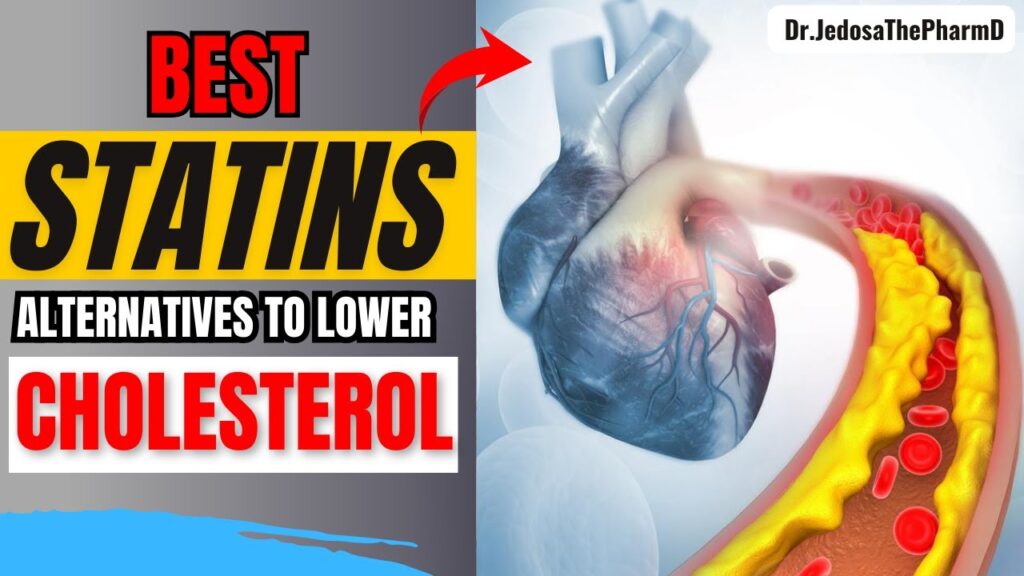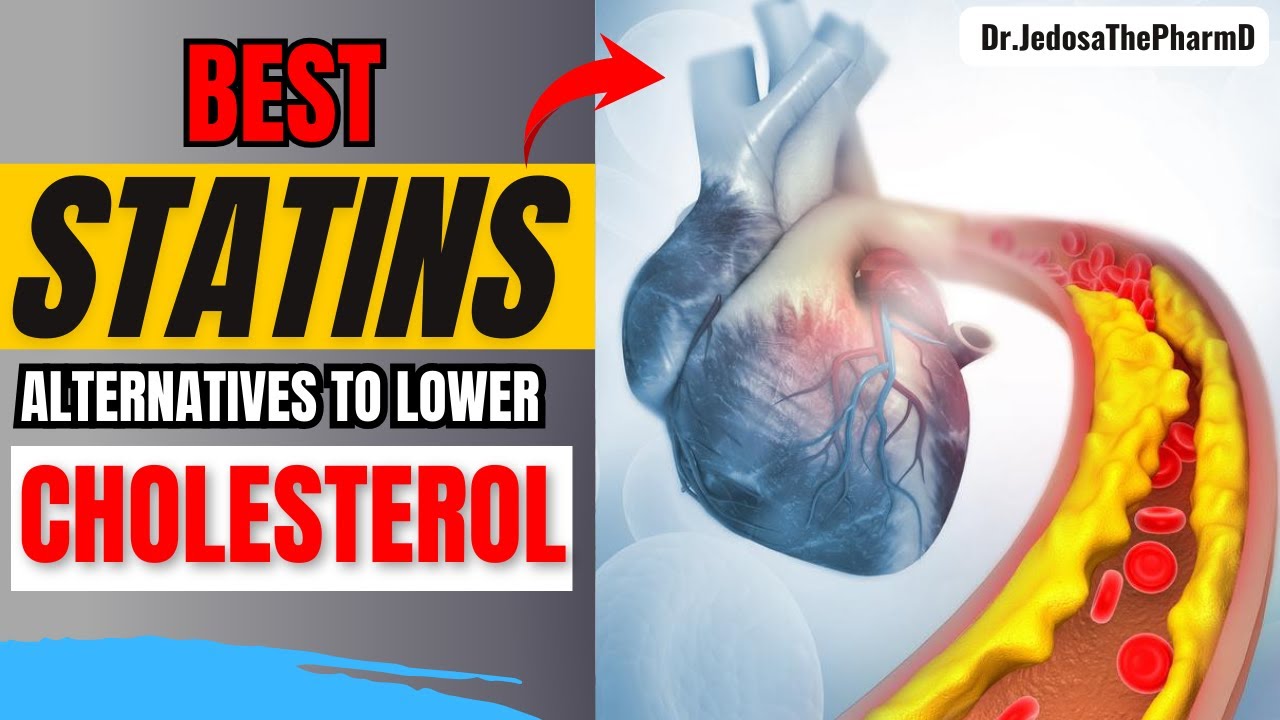High cholesterol is a serious concern for your health, and it’s essential to explore different treatment options beyond statin medications like atorvastatin, rosuvastatin, and simvastatin. In this informative video by Dr.JedosaThePharmD, you will discover five effective alternatives to lower bad cholesterol. These alternatives include Zetia, PCSK9 inhibitors, Omega-3 fatty acids, Fibrate medications, and Nexletol, each offering unique benefits in managing high cholesterol levels. It’s crucial to prioritize your heart health by considering different treatment options and lifestyle changes to effectively manage high cholesterol.
If you’re unable to take statin medications or experience side effects, these five alternatives discussed by Dr.JedosaThePharmD offer a promising solution for improving your heart health and controlling your cholesterol levels. From Zetia to Omega-3 fatty acids, each alternative works in a distinct way to lower bad cholesterol and promote cardiovascular wellness. By educating yourself on these alternatives and consulting a healthcare provider, you can proactively manage your high cholesterol and make informed decisions about your heart health.

Zetia
If you’re unable to take statins or need additional help lowering your cholesterol, Zetia (Ezetimibe) could be a suitable alternative for you. Unlike statins that work in the liver to reduce cholesterol production, Zetia works in the small intestines by blocking cholesterol absorption. This mechanism helps prevent cholesterol from entering the bloodstream and contributes to maintaining lower cholesterol levels. Zetia is generally considered safe with a low risk of side effects and can even be prescribed alongside statins for enhanced results. Additionally, a combination medication called Vytorin, containing both Ezetimibe and Simvastatin, is available for improved cholesterol management.
Mechanism of action
Zetia acts by inhibiting cholesterol absorption in the small intestines, helping to lower overall cholesterol levels in the body.
Benefits
Zetia offers an alternative method to reduce cholesterol levels, especially for individuals who cannot tolerate statins or require additional cholesterol-lowering support.
Dosage instructions
Zetia is typically taken once daily, with or without food, as prescribed by a healthcare provider. It is essential to follow the recommended dosage for optimal outcomes.
PCSK9 inhibitors
When traditional cholesterol-lowering medications like statins are not sufficient, PCSK9 inhibitors such as Praluent and Repatha can be an effective alternative. These medications are administered through injections under the skin every two weeks or once a month and work by blocking the PCSK9 enzyme in the liver. By inhibiting this enzyme, PCSK9 inhibitors help decrease LDL or “bad” cholesterol levels, promoting better cholesterol management.
How PCSK9 inhibitors work
PCSK9 inhibitors act as gatekeepers to prevent the breakdown of LDL cholesterol, allowing the body to regulate cholesterol uptake more effectively and maintain suitable levels in the bloodstream.
Benefits over statins
PCSK9 inhibitors offer a different approach to lowering cholesterol and can be beneficial for individuals who have not responded well to traditional statin therapy. They are particularly useful for those requiring additional LDL cholesterol reduction.
Side effects to watch for
While PCSK9 inhibitors are effective in managing cholesterol, they can be expensive and are typically considered after other treatment options have been explored. It’s essential to discuss potential side effects with a healthcare provider before beginning this therapy.
Omega-3 fatty acids
Omega-3 fatty acids, found in medications like Lovaza and Vascepa, are beneficial for individuals seeking an alternative to statins or those looking to supplement their heart health regimen. These essential fats are crucial for overall well-being, and while the body cannot produce them independently, they can be obtained from supplements like Lovaza and Vascepa or through specific dietary sources such as fish, avocados, flax seeds, and walnuts.
Types of omega-3 fatty acids
Medications like Lovaza and Vascepa contain concentrated forms of omega-3 fatty acids, providing a convenient method to increase intake for improved cholesterol management.
Sources of omega-3
In addition to supplements, omega-3 fatty acids can be obtained from a variety of foods rich in healthy fats, promoting heart health and aiding in the reduction of triglyceride levels.
Recommended dosage
Consult with a healthcare provider to determine the appropriate dosage of omega-3 fatty acids based on individual health needs and dietary preferences.
Fibrate medications
Fibrates like Fenofibrate and Gemfibrozil offer an alternative approach to lowering cholesterol by increasing the effectiveness of good cholesterol and reducing excess LDL cholesterol and triglycerides. These medications can be particularly advantageous for individuals dealing with both high cholesterol and elevated triglyceride levels.
How fibrates lower cholesterol
Fibrates work by instructing the body to utilize good cholesterol more efficiently while eliminating excess LDL cholesterol and triglycerides from the bloodstream.
Effectiveness compared to statins
Fibrates provide a suitable treatment option for individuals who require comprehensive management of both cholesterol and triglyceride levels, supplementing traditional therapy with additional benefits.
Common side effects
When taking fibrates, it is essential to avoid combining them with statins, especially Gemfibrozil, as this can lead to unwanted side effects such as muscle pain. Discuss potential adverse effects with a healthcare provider before initiating fibrate therapy.
Nexletol
Nexletol belongs to a drug class known as ACL inhibitors, designed to aid in managing cholesterol levels through a unique mechanism different from statins. By blocking an enzyme in the liver responsible for cholesterol production, Nexletol effectively reduces LDL cholesterol levels in the bloodstream. This medication is often prescribed in conjunction with statins for individuals requiring additional cholesterol reduction or those unable to tolerate higher statin doses.
What is Nexletol
Nexletol is a novel medication that inhibits an enzyme in the liver involved in cholesterol and fatty acid production, contributing to lower cholesterol levels and improved heart health outcomes.
Mechanism of action
By blocking the ATP citrate lice enzyme, Nexletol decreases the liver’s ability to produce cholesterol, resulting in reduced LDL cholesterol levels and enhanced cholesterol management.
Potential benefits
Nexletol offers a potent solution for individuals with heterozygous familial hypercholesterolemia, a genetic condition characterized by high LDL cholesterol levels. When used in combination with statins or as a standalone therapy, Nexletol can aid in achieving optimal cholesterol control.
Importance of Managing High Cholesterol
When dealing with high cholesterol levels, effective management is essential to reduce the risk of heart disease and other cardiovascular complications. While medication plays a significant role in cholesterol control, lifestyle changes such as a heart-healthy diet, regular exercise, and weight management are equally crucial to overall heart health.
Role of medication
Cholesterol-lowering medications, including statin alternatives like Zetia, PCSK9 inhibitors, omega-3 fatty acids, fibrates, and Nexletol, can help individuals achieve target cholesterol levels and reduce cardiovascular risk factors when used in conjunction with lifestyle modifications.
Role of lifestyle changes
Adopting healthy habits such as eating a balanced diet low in saturated fats, engaging in regular physical activity, quitting smoking, and maintaining a healthy weight are essential components of cholesterol management and overall heart health.
Impact on heart health
Properly managing high cholesterol through a combination of medication and lifestyle adjustments can significantly impact heart health by reducing the risk of heart attacks, strokes, and other cardiovascular diseases.
Consultation with Healthcare Provider
Whenever considering cholesterol-lowering therapies or making significant lifestyle changes, consulting a healthcare provider is crucial to receive personalized guidance and tailored treatment plans based on individual health needs. A healthcare professional can help monitor cholesterol levels, adjust medications, and provide ongoing support in managing high cholesterol effectively.
Importance of medical advice
Seeking guidance from a healthcare provider ensures that cholesterol management strategies align with individual health conditions and risk factors, leading to optimal treatment outcomes and improved heart health.
Individualized treatment plan
Healthcare providers can develop personalized treatment plans incorporating medication, lifestyle modifications, and regular monitoring to address high cholesterol and reduce cardiovascular risk factors effectively.
Monitoring cholesterol levels
Regular monitoring of cholesterol levels through blood tests allows healthcare providers to track treatment progress, identify changes in cholesterol levels, and make necessary adjustments to medication or lifestyle interventions for improved cholesterol management.
Video by Dr.JedosaThePharmD
Dr. JedosaThePharmD offers valuable insights into effective alternatives to traditional statin medications for lowering bad cholesterol levels. In the informative video, Dr. Jedosa discusses five alternative therapies, including Zetia, PCSK9 inhibitors, omega-3 fatty acids, fibrates, and Nexletol, highlighting their mechanisms of action, benefits, and considerations for cholesterol management.
Expert information on statin alternatives
Dr. Jedosa provides expert information on the efficacy and benefits of alternative cholesterol-lowering therapies, offering viewers a comprehensive overview of diverse treatment options beyond traditional statins.
Insight into cholesterol management
By sharing insights into how Zetia, PCSK9 inhibitors, omega-3 fatty acids, fibrates, and Nexletol work to manage cholesterol levels effectively, Dr. Jedosa empowers individuals to make informed decisions regarding their cholesterol treatment.
Benefits of exploring options beyond statins
The video emphasizes the importance of exploring alternative cholesterol management strategies to tailor treatment plans to individual needs, promoting better cholesterol control and heart health outcomes through informed choices.
Disclaimer
The content presented in this article is intended for educational purposes only and does not constitute medical advice. Individuals are encouraged to consult a healthcare provider for personalized medical recommendations, including diagnosis, treatment, and management of cholesterol-related conditions.
Information for educational purposes
The information provided in this article serves educational purposes and aims to promote awareness of various cholesterol-lowering therapies and lifestyle interventions. It is not a substitute for professional medical advice or diagnosis.
Consultation with healthcare provider recommended
Individuals with high cholesterol are advised to consult with a qualified healthcare provider for personalized guidance on cholesterol management and treatment options based on individual health needs and risk factors.
Medical advice disclaimer
While the content presented in this article aims to inform and educate readers about cholesterol management, it does not replace medical advice or recommendations from healthcare professionals. Always seek guidance from a healthcare provider for personalized health assessments and treatment plans.
Conclusion
Exploring statin alternatives is crucial for effective cholesterol management and heart health improvement. By considering a range of therapies like Zetia, PCSK9 inhibitors, omega-3 fatty acids, fibrates, and Nexletol, individuals can optimize their cholesterol control strategies and enhance cardiovascular outcomes. Consulting with a healthcare provider for tailored advice and guidance empowers individuals to make informed choices and take proactive steps in managing high cholesterol effectively for long-term heart health benefits. Remember, knowledge is key, and by educating yourself on cholesterol management options, you can make confident decisions to support your heart health journey.
